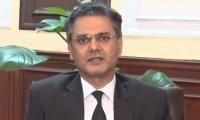ISLAMABAD: The Supreme Court Wednesday referred the pleas challenging the forcible deportation of Afghan nationals to a committee constituted for the formation of larger bench to hear matters involving interpretation of the Constitution.
A three-member bench of the apex court — headed by Justice Sardar Tariq Masood — heard the petitions. The bench comprised Justice Yahya Afridi and Justice Ayesha A Malik.
The petitioners, including PPP’s former senator Farhatullah Babar and others, had prayed the apex court for issuing a restraining order against the forcible deportation or harassment of anyone born in Pakistan and having a claim to birthright citizenship in accordance with Section 4 of the Citizenship Act, 1951, as well as the ruling of the Islamabad High Court in the 2021 case of Hafiz Hamdullah Saboor.
They submitted that the federal government should be asked to permit the UNHCR and its partner organisations to register, expedite the process and decide on all asylum-seeking applications filed by foreigners currently residing in Pakistan.
They contended the government’s policy had failed to provide any mechanism for distinguishing between the birthright citizens and illegal immigrants.
The federal government cracked down on the “undocumented” Afghan nationals, essentially those seeking refuge in the country and awaiting legal formalities.
The court observed that the petitioners had challenged the authority of the caretaker government and hence the matter needed interpretation of Article 224(IA).
The court referred the matter to a committee constituted under the Supreme Court (Practice and Procedure) Act 2023 for the constitution of a bench.
The federal caretaker government as well as the Ministry of Foreign Affairs submitted their respective replies stating that the Afghan nationals having valid legal documents were not being deported. The additional attorney general told the court that the facts mentioned by the petitioners regarding forcible deportation of Afghan nationals were totally conflicting.
The counsel for the petitioners, however, submitted that fundamental rights had to be ensured even if the Afghan nationals didn’t have legal documents adding that their deportation should be held in a transparent manner, providing them with a fair trial.
The counsel further submitted that they should be treated in accordance with the laws of the land. At this, Justice Sardar Tariq Masood observed that in this situation, they would be treated in accordance with the Foreign Act under which the Afghan nationals would be first arrested, tried and convicted and would be deported after completing their sentences.
“Do you want them to be jailed first and then deported,” Justice Masood asked the counsel. The judge said according to the government’s stance, 90 percent of illegal foreigners had gone back voluntarily.
“If a spy comes to Pakistan and after two years, he says he should not be arrested, then what will happen?” the judge asked the counsel.
The counsel, however, replied that Pakistan was signatory to the international conventions but these were not being honored.
Justice Ayesha A Malik observed that the petitioners had questioned the authority of the caretaker government, however, in its response the government had not addressed this question.
“This is the case of constitutional interpretation, hence it should be heard by a larger bench after the enactment of Supreme Court (Practice and Procedure) Act 2023, as the petitioners have challenged the authority of caretaker government and decision of apex committee,” she said.
Justice Yahya Afridi asked the additional attorney general about the stance of the caretaker federal government in this regard.
The additional attorney general submitted the government believed that this matter should be referred to the committee constituted under the Supreme Court (Practice and Procedure) Act, 2023 for the constitution of a larger bench. Later, the court referred the pleas to the said committee.
All reports circulating in the media on this matter are premature and hence shall be avoided, PCAA said
Farmers’ committee demanded that the electricity should be provided to rural feeders for eight hours instead of 3...
Establishment Division has issued the suspension orders of BS-21 officer Akram Ali Khawaja
A three-member SC bench heard a suo moto case regarding harassment of journalist
This adjustment effectively puts Tarbela Dam on a “run of the river” basis starting on Tuesday
Marwat said that he has replied to the party’s show-cause notice







